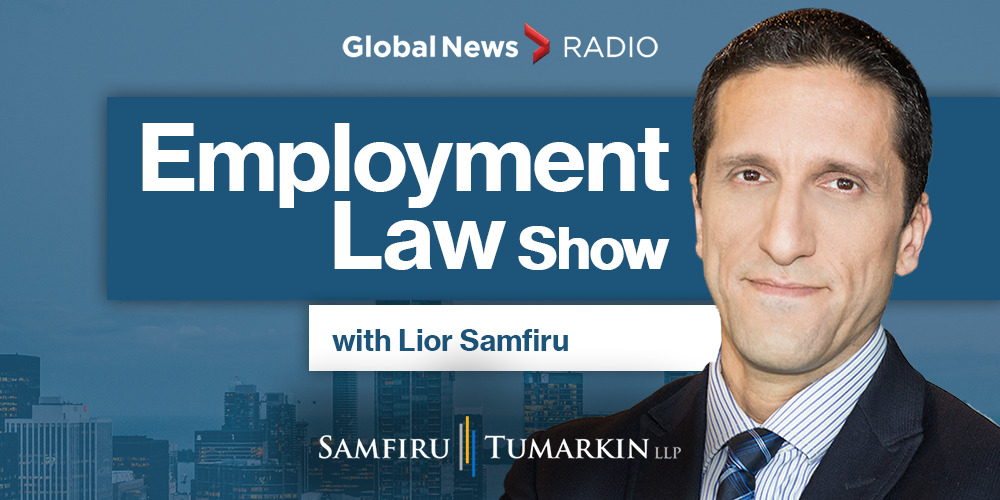Employment Law Show 640 Toronto – S9 E74

Episode Summary
What an employer cannot do, vaccines for federal employees, Uber class-action, and more on Season 9 Episode 74 of the Employment Law Show on Global News Radio 640 Toronto.
Listen below as Employment Lawyer Lior Samfiru, Partner at Samfiru Tumarkin LLP, reveals your workplace rights in Toronto, the GTA, Hamilton, London, and across Ontario on the Employment Law Show. Lior shatters myths and misconceptions about severance pay, terminations, workplace harassment, overtime pay, wrongful dismissal, constructive dismissal, duty to accommodate, independent contractors, and more.
Listen to the Episode
Episode Notes
The Uber class-action lawsuit has been certified in Ontario court.
This decision is a great step forward in the class action lawsuit against Uber on behalf of its drivers. The court agrees that the matter has merit and has to proceed to a trial and sees all Uber drivers as having common issues.
I wanted to pursue my MBA and after speaking with my employer was told they would pay for the program. An account executive then told me I’d improperly sent receipts and was terminated for cause and had to pay the balance.
It is the employer’s fault if financial errors occurred and they cannot push the blame for the mistake onto the employee. This situation would be considered a wrongful dismissal and an employee in this situation would be owed their full severance despite the fact that the employer tried to terminate the employee for cause. Employees who have been terminated for cause should speak with an employment lawyer in order to determine if the termination was justifiable.
Employers are not able to demand employees get vaccinated.
In most industries, employers cannot require employees to be vaccinated or ask about their vaccination status. The federal government has announced that federal employees and federally regulated employees must be vaccinated. The provincial government is also leaning towards mandatory vaccinations for all employees who work in long-term care.
Employers cannot reduce an employee’s compensation if they work from home.
Legally employers who demand employees continue to work remotely cannot reduce their compensation. Employers are permitted to give an employee the choice of either returning to the office or remaining at home and taking a pay cut. It is also important to remember that an employer is not permitted to force an employee to work remotely if it was not a condition of their employment.
What’s the difference between Uber drivers and workers in a trade that are considered subcontractors and not employees?
Individuals who work for the same builder and the same company for many years are legally considered to be employees but are often not aware of their rights. Many employers are not confronted with the fact that their workers are actually employees and not contractors.
Employers are not permitted to put employees on a temporary layoff.
Despite the pandemic, employers are not permitted to put employees on a temporary layoff without their consent. Employees who have been temporarily laid off can treat the layoff as termination and pursue their severance entitlements.
Employers are not able to change the terms of employment due to COVID-19.
Many employees are recalled from a layoff but their compensation has been reduced or their schedule has changed dramatically. Employees do not have to accept fundamental changes to the terms of their employment and significant changes can be considered reasons for constructive dismissal. Many employers assume that the pandemic has changed employment laws in this regard, and it has not. Employees who wish to accept the changes should communicate in writing that the changes must be temporary and an employer has to agree to them.
Employers are not able to put an employee on probation after they have already passed the original probation period.
Employees are only able to be let go without any compensation is during the original probationary period at the beginning of employment. Probation is also not automatic and must be agreed upon in an employment agreement.
Employers cannot refuse to pay employees overtime.
Employees who have worked overtime are owed overtime compensation from their employers even if the time was not initially approved. Employees who have not been properly compensated can file a complaint with the Ministry of Labour.
Employers cannot make up a fake negative performance review about an employee.
Performance reviews must be legitimate and based on facts. Employees who feel their performance reviews are inaccurate should communicate their concerns in writing to their employer. It is important for employees not to accept inaccurate performance reviews as they could be used at a later date as proof for termination.
Do federally regulated employees who have not been vaccinated have to do so immediately or can they choose to wait?
There is currently no legislation but based on the announcement by the federal government, by October 2021 employees will have to be vaccinated. There will be exemptions for employees with a medical condition or for religious reasons.
Learn More
Canadian federal employees and vaccine mandates
My employer says anything past 3 weeks of accumulated vacation will be deleted. Can he do that?
Employers are within their rights to cap an employee’s vacation days after the minimum amount of vacation days are accrued. Employees could lose extra vacation days if they are not used by a calendar year.
Employers are not able to demote an employee by making them an independent contractor.
Employers are not permitted to let an employee go and then re-hire the same individual as a contractor. Employees who are let go are owed severance and cannot be rehired in the same position.




